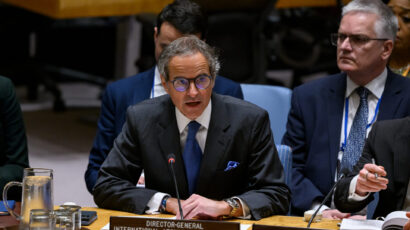Prioritize all options first
By Peter A. Bradford, June 13, 2007
Stephen Berry confronts Amory Lovins with rebuttals more applicable to new nuclear power plants
than to Lovins’s alternatives. Consider the statement, “We can’t afford to bet on only one roulette
number.” Surely the current Washington strategy of hugely disproportionate subsidy of new nuclear
power plants is closer to betting unaffordable amounts on a single roulette number than equally
backing the many variants of energy efficiency and renewables. In fact, governmental betting on
mature energy technology is a well-demonstrated way to waste public money.
Lovins, Berry and, I seem to agree on the desirability of incorporating a carbon cost in the
price of the fuels of the future. But Berry’s assertion that this will make fossil fuels equal in
cost to new nuclear power assumes several propositions as to which none of us knows anything
meaningful.
No one knows the future cost of carbon reduction, of natural gas and coal, or of new nuclear
units. Yet Berry asserts at least the relative positions of all three in a single breathtaking
prophecy: “If we were to internalize the cost of fossil fuels . . . nuclear power will immediately
be at least as cheap as fossil-generated power.”
But maybe not. Maybe the necessary carbon reductions will come from transportation, efficiency,
coal sequestration, and renewables. Maybe natural gas prices will decline, as they did in the
1980s. Maybe regulating as if nuclear power is safe because it is needed will once again bring cost
increases, as events contradict judgments. Maybe nuclear construction costs will more nearly
approximate Areva’s current cost overruns and delays in Finland than the optimism of today’s vendor
cost estimates. Maybe proliferation resulting from encouraging the casual spread of reprocessing
and enrichment to less stable nations will discredit nuclear technology altogether.
The differences among the three of us lie largely in the way that we deal with these
uncertainties.
Many people of good faith are buying into a need for nuclear power because they believe that
they know more than they really do about the future. They assume a regime in which nuclear power’s
problems are solved before they manifest themselves in real world dangers, and in which the
alternatives are less capable than nuclear power of scaling up fast enough.
But the nuclear power that we have invariably gotten from the Washington sausage machine doesn’t
conform to this idealized version. That process demands licenses without an impartial licensing
process, public acquiescence without public involvement, spent fuel without a waste repository,
multibillion dollar projects without analysis of alternatives, nearly separated plutonium (per the
Global Nuclear Energy Partnership) without adequate safeguards–in short, a renaissance without
masterpieces.
Even the apparently reasonable assertion that “we must pursue all the plausible paths” invites
disappointment. Such assertions were a centerpiece of now discredited nuclear industry refutations
of Lovins in the 1970s. Pursuing all plausible paths costs too much, and some activities are
inconsistent with others. The builder of a 1500 MW nuclear plant must oppose efficiency investments
sufficient to reduce the price for the plant’s output.
Prioritization is needed. A wise society will look first to markets (adjusted for externalities)
to prioritize. Beyond that will come research and commercialization packages arranged according to
speed, size, cost-effectiveness, and the absence of unacceptable side effects.
I don’t think Berry disagrees with this, but I do think that he misunderstands the extent to
which real world nuclear technology refuses to live by these rules, and perhaps cannot do so. I’m
willing to use the nuclear units that emerge from such prioritization as part of a climate change
strategy.
But I want those asking me to buy into their renaissance to submit to a meaningful
prioritization exercise first. Otherwise, we’ll continue our “sentence first, verdict later” energy
policy making, an expensive and ineffectual process less analogous to roulette than to
pin-the-tail-on-the-donkey, a contest in which the apparent deciders are blindfolded and spun dizzy
by those really in charge.
Share: [addthis tool="addthis_inline_share_toolbox"]














